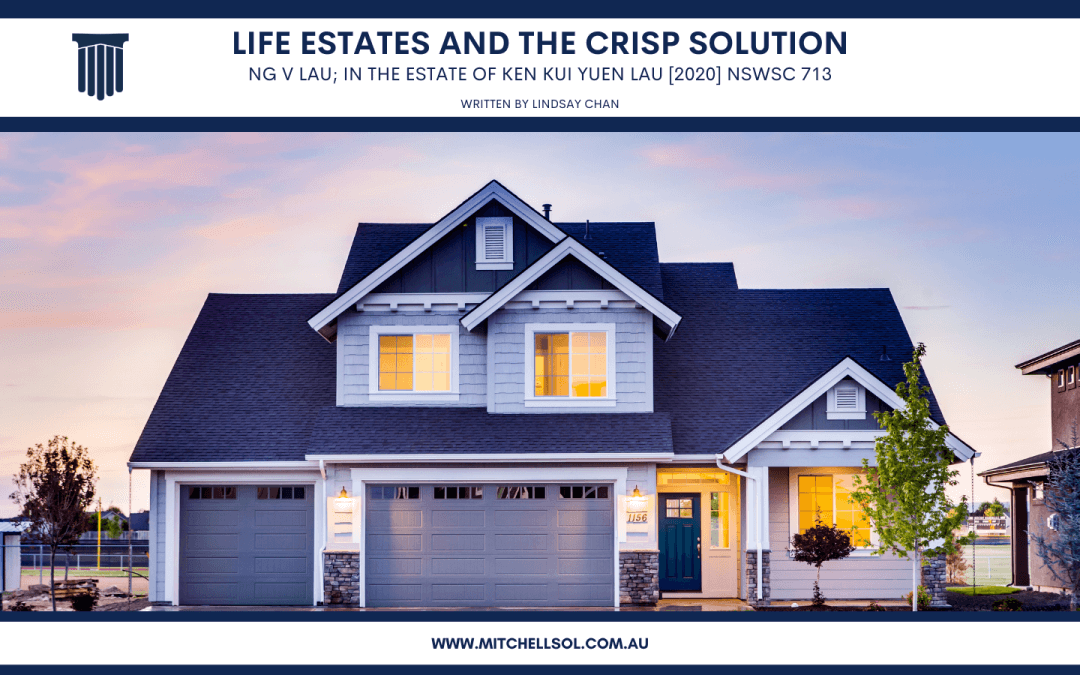Life Estates And The Crisp Solution
Ng v Lau; In the Estate of Ken Kui Yuen Lau [2020] NSWSC 713
Everyone deserves a second chance but sometimes second marriages and blended families can cause headaches when it comes to making sure that both your current partner and the children from your previous marriage are taken care of by your estate when you die.
Which is why leaving a life estate could seem to be the answer to your problems.
A life estate gives full ownership rights to the recipient, other than the right for the recipient to pass the property to their heirs upon their recipient’s death. By leaving a life estate to your new love of your life, you can ensure that they can stay in the property until their death, upon which the property can then pass to your children keeping your family home firmly in your bloodline.
Unfortunately, life estates aren’t always the solution that advisors make them out to be as the case of Ng v Lau; In the Estate of Ken Kui Yuen Lau [2020], NSWSC 713 will demonstrate.
Mr Lau made a will in 2001 where he left his second wife Mary full ownership of the Bexley property and half of the residue, which included an investment property. Mary was also the beneficiary of the deceased’s superannuation. The other half of the residue was left to the deceased’s son from his first marriage, Gary.
When her husband died in 2018, Mary was shocked to find that her husband had written a second will in 2016, which she was unaware of, and which only left her a life interest in the Bexley property, and Gary would inherit the property upon her death.
Mary made a Family Provision Claim on her late husband’s estate on the basis that she believed the 2016 will had been made in suspicious circumstances. Her husband hadn’t discussed the will with her, had used a different lawyer than the one used for the 2001 will and had waited until she was abroad before meeting the new lawyer. Mary was adamant that her husband hadn’t understood the implications of a life interest and therefore the 2016 will didn’t reflect his testamentary intentions.
Gary provided evidence that his father was aware of the 2016 will and had shown the will file to Gary and allowed him to take a picture of it. The 2016 will was rational and did not exclude either of the other two beneficiaries that were also provided for in the 2001 will.
Although the court accepted the 2016 will expressed Mr Lau’s testamentary intentions, they were aware that the 2016 will didn’t provide adequately for Mary for three reasons:
- The life estate was Inflexible– Mary was 74 and would only be able to maintain the property for a limited amount of years before she would be forced to consider alternative, more suitable accommodation. However, under the life interest, she would be forced to stay in the property until her death.
- The life estate didn’t adequately provide for Mary — although Mary was entitled to half of the residue of her husband’s estate, the court found that on the facts of this case, this was insufficient provision in circumstances where Mary was required to keep the matrimonial home in a reasonable state of repair and did not have the option to swap the matrimonial home for more appropriate accommodation; and
- The life estate was an administrative burden — the maintenance of a life estate means that the executor appointed under a will is required to manage the estate for many years. At the time of the hearing, Mary had a life expectancy of 15 years. This meant that she and Gary would remain as co-executors for a significant space of time.
The court had an ace up its sleeve in the form of a Crisp Order. A Crisp Order gave Mary a ‘portable’ life interest in the property, which would allow her to move to other accommodation in a retirement village or home which would be funded from the estate. In addition, the court ordered further provision of $45,000.00 from the estate for Mary in order to cover the necessary costs of improvements to the Bexley property and other minor expenditures.
Although Mary was adequately provided for, thanks to the Crisp Order, and Gary received enough provision to be comfortable until the property passed to him, leaving someone a life interest isn’t always the magic solution you would be led to believe.
An estate with less assets would result in a delay in inheritance for your other beneficiaries with some possibly dying before they receive your gift. In addition, a life estate needs money in the estate to maintain and cover insurance and repairs so you need to be sure that your estate can cover these costs for a number of years.
If you’re considering something as complex and consequential as a life estate then it’s essential that you seek specialist legal advice from a solicitor who specialises in wills and estates. Making the wrong change could leave both your beneficiaries and your estate short.
We offer a FREE 10-minute phone call consultation. Please contact us on +617 3373 3363.

